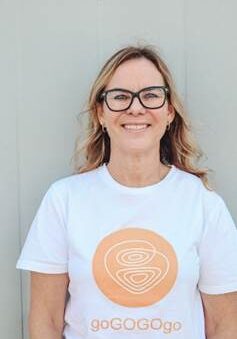Most people think of their grandmothers as sweet, unassuming ladies who bake, knit, and who love to spoil kids with too much pocket money. The reality, however, is that they are the unsung heroes of South Africa, putting in the work to empower future generations and contributing to the economic upliftment of the country.
Approximately four million children in South Africa are being raised by grandmothers, also known as gogos. This means that a considerable number of households are surviving on a single SASSA older persons or childcare grant, which at just over R2,000 per month respectively, cannot realistically meet the needs of a household. This, according to Jane Simmonds, executive director and founder of the goGOGOgo initiative, places these matriarchs in a uniquely important position.
“Gogos have become the breadwinners in households. They have also become the decision-makers of how this grant is spent on essential and social needs. These decisions have an impact not only on the family but also on communities and the economy at large,” says the non-profit founder.
Gogo’s got skills
goGOGOgo was founded in 2020 to support gogos across the country in building capacity, skills, and knowledge, with the ultimate goal of empowering these third-generation women to mentor the next generation of adults.
“By empowering gogos, we support them in their role of raising grandchildren with better education and health outcomes, which will lead to greater economic opportunities for these grandchildren,” adds Simmonds.
One of the organisation’s many projects include the iGOGO initiative, established to equip gogos with digital literacy skills and improve internet access in more households across the country. Through its partnership with fibre provider Vuma, GOGOs with Vuma was launched, enabling gogos to receive interactive training and digital devices. This initiative enhances educational outcomes for both the gogos and the children they care for and includes a graduation ceremony to honour their participation in the training.
With gogos being the primary caregivers in many children’s lives, the onus falls on them to ensure their dependents have access to appropriate educational opportunities, particularly those that will prepare them for the future world of work. Many gogos are either ill-equipped to provide access to online educational platforms or are worried about the risks associated with internet access, limiting their learning as a result.
Without the right interventions, this lack of access and misinformation around the necessity of digital skills can lead to economic disparities. As a result, both gogos and the children they care for, may struggle to access learning resources, job opportunities, or services that could improve their household’s financial well-being.
“I have improved my communication; I have gained access to do things online by myself without any help from my grandchildren and I can also manage my money on the banking app without going to the bank,” says 64-year-old Nofezile Mathome, a beneficiary of the GOGOs with Vuma project.
Pearl Cornelissen, who is 53, says GOGOs with Vuma helped her to learn how to use technology to monitor her grandchildren’s educational progress. “I now have a school group chat for my grandchild, and I receive updates on school-related matters via WhatsApp. I also assist my grandchildren with homework and assignments using the internet.”
Mam’Nofezile and Mam’Pearl are just two of over 230 other gogos across Gauteng, Limpopo, KwaZulu Natal, the Eastern Cape and the Western Cape who are embracing tech skills for the betterment of themselves, the children they care for, and the communities they are part of.
But grandmothers across the country, responsible for caring for and capacitating future generations, are also increasingly contributing the country’s gross domestic profit (GDP) as small business owners.
The ripple effect of creating economic opportunities for the elderly
Paulina Madira Matlou is a 61-year-old grandmother living in Limpopo with 10 grandchildren in her care. Paulina works as a seamstress to provide for herself and her family. With the help of the GOGOs with Vuma initiative, which provided her with a smart device and digital literacy skills, she is able to work from home and grow her business.
“I use the online tools to advertise my sewing business. I post the clothes I create on Facebook Marketplace, and I get a payment through my phone,” says Paulina. “I can now communicate with people through WhatsApp, Messenger, Facebook, Instagram and Twitter, using the knowledge I have.”
Similarly, Hellen Masha, a 53-year-old grandmother living in Atteridgeville, Pretoria, who runs her own atchaar condiment business, is now making use of internet banking services to make and receive payments.
“I can now use my device without any help from grandchildren. I no longer need to go to the bank for transactions I can do it myself, and soon I’ll be able to do online shopping,” Helen says proudly.
Helen also used her GOGOs with Vuma-sponsored tablet to help her grandchild apply for and obtain a learnership.
“Gogos may well be the economic backbone of the country, and the key to upliftment in the future. By empowering third generation women across South Africa, many of whom are breadwinners for their families and sole caregivers for their grandchildren, with digital skills, devices, and improved internet access to the home, economic development will likely flourish in South Africa’s future,” says Lianne Williams, Marketing Director at Vuma.
“Through GOGOs with Vuma, we’ll continue to identify these needs in communities and strive to provide new possibilities for better development.”

